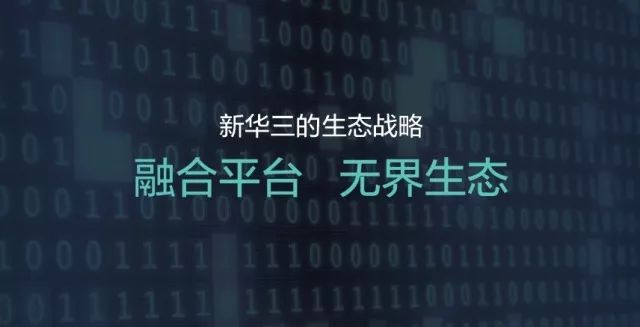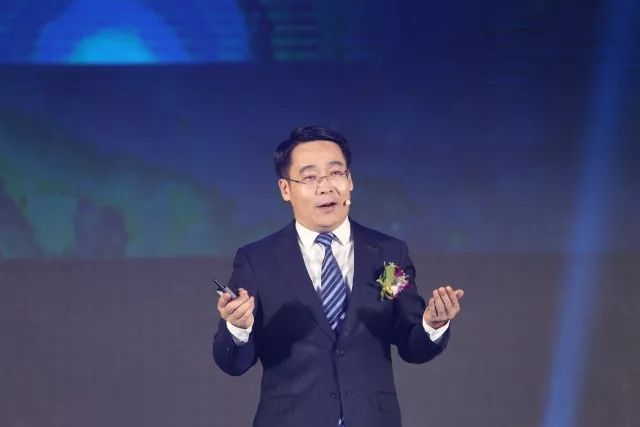Inclusive Platform and Borderless Ecology, H3C Released Whole New Ecology Strategy
In the digital age, the definition of ecology has changed dramatically, and industries are taking ever greater cross-border efforts, making “borderless ecology” a direction of future development. As ecology border and cooperation border disappear, how should enterprises cope with such a scenario? At “2018 NAVIGATE” held on March 31, H3C of Tsinghua Unigroup exchanged views with government officers, industrial leaders, industry elites, and other guests on the evolution of industrial ecology, and rolled out its “Inclusive Platform Borderless Ecology” strategy, highlighting the objective of H3C of powering various industries to realize digital transformation through “technology” and “ecology”.

H3C believes that in the digital age, customers, partners, and manufacturers should see each other as partners, and empower each other. Traditional ecology calls for being redefined, and “borderless ecology” that focuses on value is the future. Gaining in-depth insights into the development trend of ecology, H3C has proposed a whole new ecology strategy, and views “organizational guarantee, focusing on plan, joint operation, and innovation incubation” as its action platform. That is how H3C seeks to push for the co-building of “borderless ecology”, and to offer ecology support of the greatest innovation dynamic to the construction of a “digital China”.
Industrial Cross-border Efforts Accelerate the Advent of “Borderless Ecology”

Wang Jingpo, Co-President of H3C Group and President of Chinese Area of H3C Group, delivers a keynote speech
Wang Jingpo, Co-President of H3C Group and President of Chinese Area of H3C Group, delivered a keynote speech. He elaborated on the judgment and understanding of H3C when it comes to ecological evolution. He said that in the digital age, cross-border efforts are gathering pace. Since borders limit our thinking and imagination, “borderless ecology” will be bound to replace traditional ecology. Sharing the same goal of digitization, enterprises, customers, and partners constitute a “community of shared destiny”. As such, they empower each other, influence each other, and integrate with each other, thus creating whole new products, services and business models.
Wang Jingpo pointed out that, compared with traditional ecology of “manufacturer + partner”, “borderless ecology” mainly feature focusing on value and downplaying borders. Players of “borderless ecology” treat each other as partners and empower each other. The whole new value of “borderless ecology” lies in creating new business models and whole new offerings.
Five Inclusive Technology Platforms Cope with Five Border Challenges
H3C believes that, despite the advent of “borderless ecology”, it still faces five border challenges. As for technology, diverse technologies make it difficult to coordinate. As regard to talent, traditional specialization training model makes it hard to secure cross-border talents. As far as delivery is concerned, it is increasingly difficult and complex to ensure delivery. In terms of organization, collaboration barriers hold back the progress of cooperation. As for capability, innovation-oriented enterprises normally lack capital and market capability.
Facing such five border challenges, H3C declared to integrate and build five inclusive platforms, and to enable ecology to cross traditional borders. Among which, inclusive technology platform will provide technology possibilities for “borderless ecology”; inclusive marketing, operation and service platforms will empower market, operation and service capabilities on multiple players of “borderless ecology”; inclusive talent platform will offer cross-border talents to “borderless ecology” in a sustained manner.
H3C’s Action Platform Provides All-round Support for the Materialization of “Borderless Ecology”
To better facilitate the construction of “borderless ecology”, H3C released an ecology action platform, namely “organizational guarantee, focusing on plan, joint operation, and innovation incubation”. At the same time, H3C announced that it would establish H3C Ecology Committee headed by Tony Yu, President and CEO of H3C Group, thus providing strong support for the building of “borderless ecology” in terms of organizational system.
Meanwhile, H3C would set up “Seed Program”, “H3C Digital Innovation LAB”, and other action mechanisms, and pool together 300 plus industrial leading providers of application solutions, and work with ecology partners to shape more than 600 digital solutions while focusing on the “core” of cooperation value. Through joint venture, revenue-sharing model and other joint operation methods, H3C will offer partners with its capital, products, talents, technologies, services, and marketing capability. As for innovation incubation, H3C will allocate RMB 1 billion as incubation fund, and provide needed capital and services for excellent solutions and teams, and offer resources to co-expand market. When it comes to talent training, H3C will foster professionals for the industry and ecology building through H3C University, “Spark Program” and other agencies, and talent training programs.
In the future, H3C will shoulder more social responsibilities as an industrial leader. That is how H3C seeks to realize ecology convergence, push for digital innovation, and power industries to enter application stage from digital exploration and restructuring phase, and finally fully integrate into the digital era.

